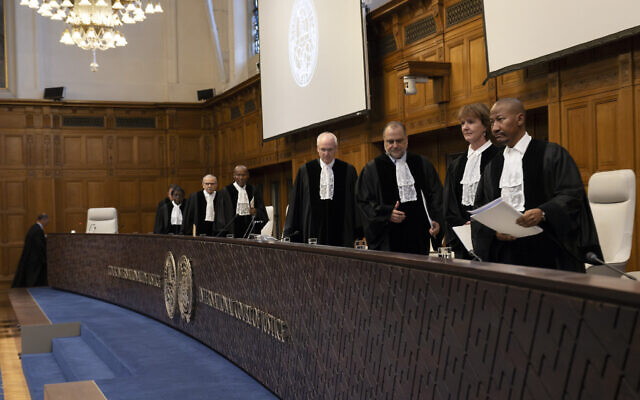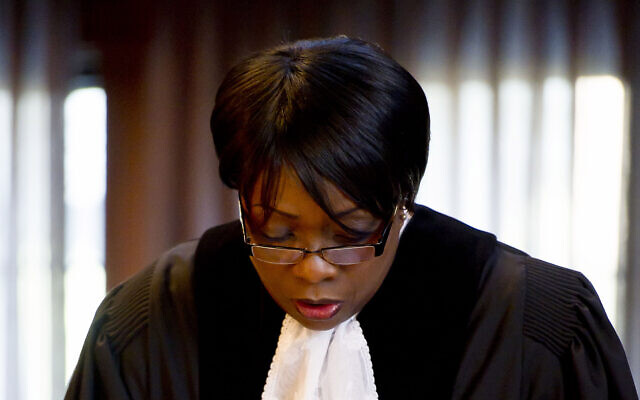The International Court of Justice Ruling on Israel
"The measure [that Israel comply with 'its obligations under the Genocide Convention'] is a qualified one, which preserves Israel's right to prevent and repel threats and attacks by Hamas, defend itself and its citizens, and free the hostages.""Why would a State that has the intention to destroy a group provide tents, humanitarian aid and field hospitals? Why would they issue warnings and build humanitarian zones?"Justice Aharon Barak, Judge on ICJ bench"Egypt, which shares a border with Gaza and controls part of both the Rafah and Kerem Shalom crossing facilities, plays a key role in facilitating aid delivery through the Rafah crossing. Without Egypt's cooperation, Israel alone cannot 'maintain open the Rafah crossing' which would render the Court's current order, which is directed at Israel but not Egypt, impracticable."
"It is plausible that additional hostages in captivity remain in the area, which is why Israel has declared its intention to locate and return them, dead or alive, to their families. this is a right that the Court cannot deny Israel or the hostages.""Regrettably, the wording of the Court's directive ... is susceptible to ambiguity and could be misunderstood or misconstrued as ordering an indefinite, unilateral ceasefire, thereby exemplifying an untenable overreach on the part of the Court."Dissenting ICJ Judge Julia Sebutinde
 |
| Judges arrive at the International Court of Justice (ICJ) to rule on South Africa's request on a Rafah and wider Gaza war ceasefire, in The Hague, on May 24, 2024 (Nick Gammon / AFP) |
Many
from within the international community in analyzing the ruling against
Israel in its Gaza intervention have interpreted that ruling by the
International Court of Justice as a direct order to the Jewish State to
put an immediate stop to its military Rafah operation. The recent
airstrike by Israel targeting two Hamas terrorist leaders was
complicated by their small precision bombs igniting stored Hamas
munitions in a warehouse a short distance from a tent camp to explode
and start a massive fire killing scores of Palestinians as well as the
two targets.
Prompting Joseph Borrell, head of the European Union foreign ministers group to state: "Unhappily,
what we have seen in the immediate hours, is that Israel continues the
military action that it has been asked to stop". He
is, however, wrong in his interpretation, a shocking misalignment of
reality for someone in the position that he holds, but readily
understood in the aura of the present time when Israel's 'allies'
against a sadistically savage terrorist group hold Israel to a standard
they would themselves never aspire to.
Analyzed
and correctly interpreted the International Court of Justice ruling is
conditional, ambiguously so. Among the judges on the ICJ deliberative
bench was a former president of the Israeli Supreme Court, Judge Aharon
Barak whose insights disrupted the South African case brought against
Israel. Judge Barak's introduction of clarity and reality steered the
deliberative conclusion of the ICJ's directive despite concerns over the
conflict-fallout welfare of ordinary Palestinians.
"There
are no more words to describe the horrors in Gaza. Almost daily we are
confronted with gut-wrenching accounts of victims and survivors and
images of unimaginable suffering", was the plaint of
South African Judge Dire Tladi. One is constrained to wonder whether
this same anguished judge waxed so eloquently despairingly over the many
abhorrent videos displayed with pride of accomplishment by Hamas
operatives documenting for posterity the sadism they brought to raping,
torturing and slaughtering Israeli children, women, the elderly and
infirm, and those they took as sex-torment hostages.
"[The majority decision “requires Israel to halt its military offensive in the Rafah Governorate only in so far as is necessary to comply with Israel’s obligations under the Genocide Convention.""Israel is not prevented from carrying out its military operation in the Rafah Governorate as long as it fulfills its obligations under the Genocide Convention.""As a result, the measure is a qualified one, which preserves Israel’s right to prevent and repel threats and attacks by Hamas, defend itself and its citizens, and free the hostages."Israeli Justice Aharon Barak
In
reminding Israel, in its ruling of its obligation to comply with the
Geneva Convention, the panel failed to acknowledge that Israel is, in
point of fact, complying completely with the Geneva Convention which
holds that a state is completely within its international rights of
self-defense in militarily seeking to destroy any other entity or
country that has demonstrated amply its intention of destroying the
country it has unilaterally attacked.
The court focused on 'plausible intent' under the Genocide Convention; an issue that Justice Barak addressed, pointing out that "no show of intent whatsoever" existed
on Israel's part; the opposite in fact was demonstrated with Israel's
military using every means at their disposal to minimize their attacks
against Hamas terrorists resulting in 'collateral' damage. The
International Court of Justice was concerned by the need for emergency
aid reaching Gaza's civilian population.
"As
a result of these [previously court-ordered] increased efforts,
thousands of food trucks have entered Gaza; multiple large bakeries have
reopened; greater amounts of animal fodder have been able to enter the
Strip; water pipelines have been repaired and water pumps supplied with
fuel; millions of litres of fuel have been able to enter Gaza; and
clothing, hygiene and sanitation supplies have been supplied to Gazan
civilians", assured ICJ dissenting Judge Sebutinde.
 |
| Ugandan Judge Julia Sebutinde makes her solemn declaration as a new member of the ICJ in the Great Hall of Justice of the Peace Palace in The Hague, March 12, 2012. (ICJ) |
The ICJ in its ruling ordered Israel to "maintain open the Rafah crossing"
for the entry of humanitarian aid, ignoring the reality that the
crossing is controlled by both Israel and Egypt. A gross oversight on
the part of the international court spurred to action and to condemn
Israel was the inescapable omission of any mention of the threat that
Hamas poses; much less any attention given to the plight of the Israeli
hostages. Judge Sebutinde correctly noted the ICJ's bias against Israel.
 |
| Retired Supreme Court President Aharon Barak sworn in as Israel’s appointee to the bench at the International Court of Justice in The Hague, January 11, 2024 (ICJ) |
"I am not oblivious to the increasing suffering in Gaza. The key to ending this war lies in the hands of Hamas.""Hamas has started the war and can finish it by releasing the hostages and by fully respecting the security of the State of Israel and its citizens."Israeli Judge Aharon Barak
Labels: Hamas Invasion of Southern Israel, Hamas Rape/Mutilation/Murder of Israelis, International Court of Justice, Israel Defense Forces in Gaza, October 7

<< Home